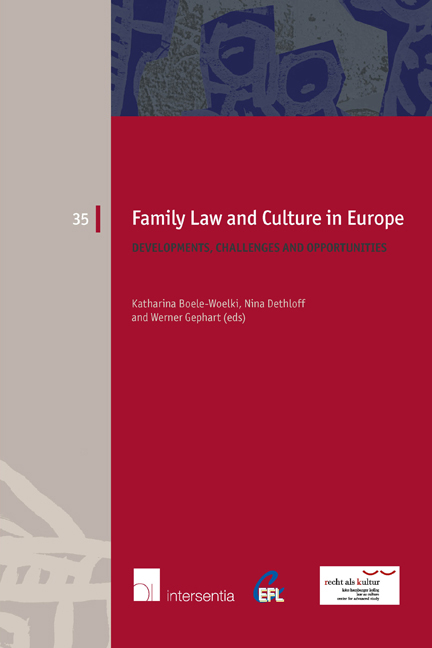Book contents
- Frontmatter
- Preface
- Contents
- List of Authors
- PART ONE THE CEFL PRINCIPLES ON PROPERTY RELATIONS BETWEEN SPOUSES
- PART TWO BREAKUP OF (NON-)FORMALISED RELATIONSHIPS
- Statutory Regulation of Cohabiting Relationships in the Nordic Countries: Recent Developments and Future Challenges
- Legislating for Cohabitation in Common Law Jurisdictions in Europe: Two Steps Forward and One Step Back?
- The Swedish Cohabitees Act in Today's Society
- Maintenance between Former Spouses and Gender Equality
- Collaborative Practice: An Interdisciplinary Approach to the Resolution of Confl ict in Family Law Matters
- PART THREE NEW CONCEPTS OF PARENTAGE
- PART FOUR INTERNATIONAL FAMILY RELATIONSHIPS
- PART FIVE TRANSNATIONAL FAMILIES: ACROSS NATIONS AND CULTURES
- EUROPEAN FAMILY LAW SERIES
Collaborative Practice: An Interdisciplinary Approach to the Resolution of Confl ict in Family Law Matters
from PART TWO - BREAKUP OF (NON-)FORMALISED RELATIONSHIPS
Published online by Cambridge University Press: 22 November 2017
- Frontmatter
- Preface
- Contents
- List of Authors
- PART ONE THE CEFL PRINCIPLES ON PROPERTY RELATIONS BETWEEN SPOUSES
- PART TWO BREAKUP OF (NON-)FORMALISED RELATIONSHIPS
- Statutory Regulation of Cohabiting Relationships in the Nordic Countries: Recent Developments and Future Challenges
- Legislating for Cohabitation in Common Law Jurisdictions in Europe: Two Steps Forward and One Step Back?
- The Swedish Cohabitees Act in Today's Society
- Maintenance between Former Spouses and Gender Equality
- Collaborative Practice: An Interdisciplinary Approach to the Resolution of Confl ict in Family Law Matters
- PART THREE NEW CONCEPTS OF PARENTAGE
- PART FOUR INTERNATIONAL FAMILY RELATIONSHIPS
- PART FIVE TRANSNATIONAL FAMILIES: ACROSS NATIONS AND CULTURES
- EUROPEAN FAMILY LAW SERIES
Summary
INTRODUCTION
Divorce has been described as:
‘[D]reams unfilled, or dreams that have run their course. It may be profound grief and it may be bittersweet freedom. It is about families restructuring: financially, emotionally and practically. It is both conflict and resolution. It is pain and it is relief.’
This paper examines a new method of alternative dispute resolution in family law which purports to provide an interdisciplinary framework within which to explore and resolve the legal, financial and emotional aspects of relationship breakdown. This process, known as collaborative practice or collaborative divorce, originated in the US in the early 1990s and is now used worldwide in the resolution of conflict in family law matters.
Menkel-Meadow notes that ‘[d]isputing … will (oft en) reflect the culture'2 values, and it may not be wise to attempt to transplant a form of disputing that is not indigenous to, or compatible with, a different culture.’ This chapter will therefore explore the extent to which the collaborative model is compatible with the Irish family law system and will examine the changes that have been made to the process to adapt it to meet the relevant cultural needs of Irish society.
While research has been carried out into the process in the US, Canada and England and Wales, this chapter will present the preliminary findings of the first known empirical research into collaborative practice in Ireland, contextualising the Irish position within the international framework. Specifically, the paper will present the results of one aspect of a larger multilayered research project into the development of collaborative practice in Ireland: the views of separating parties who have used the process in the resolution of their family law disputes.
THE IRISH DIVORCE LANDSCAPE
The right to marry and found a family was enshrined in the Irish Constitution in 1937. The family is described therein as:
‘the natural primary and fundamental unit group of Society, and as a moral institution possessing inalienable and imprescriptible rights, antecedent and superior to all positive law.’
The State also pledged ‘itself to guard with special care the institution of Marriage, on which the Family is founded, and to protect it against attack.’
- Type
- Chapter
- Information
- Family Law and Culture in EuropeDevelopments, Challenges and Opportunities, pp. 119 - 134Publisher: IntersentiaPrint publication year: 2014

